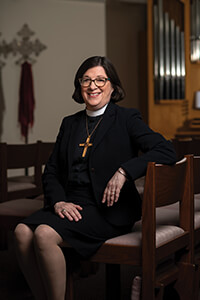We are the body of Christ
September 3, 2021
There was once a time when two distinct peoples were trying to comprehend how they could be one people. One was a millennia-old people who had persevered through enslavement, oppression and exile. And they still preserved their identity and trust in God. They believed that God had blessed them to be a blessing to all humanity even when the rest of humanity reacted violently against them. They believed that God had made an everlasting covenant with them and had given them a sign of that promise.
The other people were hostile, polytheistic, the majority and suspicious of the other. They rejected any claims by the other group that a life lived by covenant obligations could possibly be a good one. This wasn’t just a lack of understanding, but antagonism and contempt.
Then, something happened. Through the cross these two peoples became one people. This is the story of the first-century church. “But now in Christ Jesus you who were once far off have been brought near by the blood of Christ. For he is our peace; in his flesh he has made both groups into one and has broken down the dividing wall, that is, the hostility between us” (Ephesians 2:13-14).
I think it’s difficult for 21st-century Christians to comprehend the seismic shift that had occurred. The very first Christians were Jews. They didn’t see themselves apart from the covenant God had made with God’s people. The Torah wasn’t an arbitrary collection of burdensome requirements. It was the living voice of the God of Abraham, Isaac and Jacob in their midst and throughout their lives. The circumcision of males was a sign of that covenant, a sign instituted by God and communicated to the people by Moses. Jesus was circumcised. Paul was circumcised. The male disciples were circumcised.
I think it’s difficult for 21st-century Christians to comprehend the seismic shift that had occurred.
But what to do about the uncircumcised gentiles? How could they possibly be considered part of the covenant? They were “other,” literally beyond the pale. “So then, remember that at one time you Gentiles by birth, called ‘the uncircumcision’ by those who are called ‘the circumcision’ … remember that you were at that time without Christ, being aliens from the commonwealth of Israel, and strangers to the covenants of promise, having no hope and without God in the world” (Ephesians 2:11-12).
This was a critical moment for the early church. Paul and others had witnessed the Spirit at work among the gentiles, who weren’t circumcised and, therefore, weren’t considered to be heirs of the covenant. The dispute between the two groups was heated. It went to the very core of what it meant to be part of the church. Peter and Paul weren’t of one mind. Could these competing understandings of God’s work in the community be reconciled?
This was brought to the apostles and elders in Jerusalem. They took counsel from Scripture, tradition and the report of the outpouring of the Spirit. They then sent this decision to the gentiles: “For it has seemed good to the Holy Spirit and to us to impose on you no further burden than these essentials: that you abstain from what has been sacrificed to idols and from blood and from what is strangled and from fornication. If you keep yourselves from these, you will do well” (Acts 15:28-29). They were “no longer strangers and aliens,” but “citizens with the saints and also members of the household of God” (Ephesians 2:19).
They were one body. We are one body. We are the body of Christ. We are members one of another and knit together by and in Christ. Yes, we have significant disagreement about very important issues, but our cultural and political differences cannot dissolve this bond.
We can take heart from the example of the early church. If, by the Spirit’s power, they could set aside their differences—which were far greater than any of ours—then we, too, by the power of the Spirit, can live into the unity that already exists in Christ.


